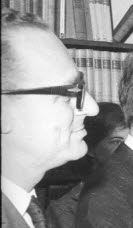Jean-Marie Straub and Danièle Huillet were a duo of French filmmakers who made two dozen films between 1963 and 2006. Their films are noted for their rigorous, intellectually stimulating style and radical, communist politics. While both were French, they worked mostly in Germany and Italy. From the Clouds to the Resistance (1979) and Sicilia! (1999) are among the duo's best regarded works.

Michael Andreas Gielen was an Austrian conductor and composer known for promoting contemporary music in opera and concert. Principally active in Europe, his performances are characterized by precision and vivacity, aiding his ability to interpret the complex contemporary music he specialized in.

Elegy for Young Lovers is an opera in three acts by Hans Werner Henze to an English libretto by W. H. Auden and Chester Kallman.

Moses und Aron is a three-act opera by Arnold Schoenberg with the music to the third act unfinished. The German libretto is by the composer after the Book of Exodus.

Moses und Aron, known in English as Moses and Aaron, is a 1975 film by the French filmmaking duo of Jean-Marie Straub and Danièle Huillet based on the unfinished opera of the same title by Arnold Schoenberg. During its 1975 run at US festivals, it was also known as Aaron and Moses, and was frequently reviewed as such.

Karl V. is an opera, described as a Bühnenwerk mit Musik by Ernst Krenek, his opus 73. The German libretto is by the composer. His student Virginia Seay collaborated with him on the English translation of the libretto.
Zeitoper was a short-lived genre of opera associated with Weimar Germany. It is not known when or by whom the term was coined, but by 1928 Kurt Weill was able to complain that it was more a slogan than a description. Like opera buffa it used contemporary settings and characters, comic or at least satiric plots and aimed at musical accessibility. Two distinguishing characteristics are a tendency to incorporate modern technology and frequent allusions to popular music, especially jazz. This last, more than any social satire, earned the suspicion of the political right and ensured that it would not survive into the Nazi era.

Cristoforo Colombo is an opera in four acts and an epilogue by Alberto Franchetti to an Italian libretto by Luigi Illica. It was written in 1892 to commemorate the 400th anniversary of Christopher Columbus' arrival in America.
Else Gentner-Fischer was a German operatic soprano. Although she appeared in operas internationally, her career was mainly centered at the Oper Frankfurt where she was a resident artist from 1907-1935. She excelled in the dramatic soprano repertoire, drawing particular acclaim for her portrayal of Wagnerian heroines. She was also an exponent of the works of contemporary composers. Her career was cut short in 1935 due to political pressures and prejudice exerted against her for being married to a Jewish man. She made recordings with Gramophone & Typewriter Ltd., His Master's Voice, and Polydor Records.
Günter Reich, also spelled Günther Reich and Gunther Reich, was an Israeli baritone of German birth. He was a member of the Staatsoper Stuttgart for more than 20 years and is known for interpreting the works of Arnold Schoenberg in collaboration with Michael Gielen and Pierre Boulez.

Prinzessin Brambilla, Op. 12b, is an opera in a prologue and five scenes by Walter Braunfels. The German libretto, written by the composer, is based on the novella of the same name by E. T. A. Hoffmann published in 1820.
Gertrud Bertha Schoenberg was an Austrian opera librettist. She was the second wife of Austrian composer Arnold Schoenberg, whom she married in 1924, and the sister of his pupil, the violinist Rudolf Kolisch.
Der Sturm is a German-language opera in three acts and an epilogue by the Swiss composer Frank Martin to a libretto based on the Schlegel/Tieck German translation of Shakespeare's The Tempest.

Bluthochzeit is an opera in two acts by Wolfgang Fortner. The libretto, also by Fortner, is based on Enrique Beck's German translation of García Lorca's 1933 play Bodas de sangre. It premiered at the Cologne Opera on 8 June 1957.

The NDR Chor is the choir of the German broadcaster Norddeutscher Rundfunk (NDR), based in Hamburg. It was founded in 1946, with Max Thurn as the first director of then 55 singers. The group has participated in premieres of contemporary music, such as the posthumous concert premiere of Schoenberg's opera Moses und Aron. It is also known for a capella music, introduced by Helmut Franz such as a recording of all such works by Johannes Brahms. The current artistic director is Philipp Ahmann, who has held the position from 2008. NDR Chor, now a group of 28 singers, is one of the leading professional chamber choirs in Germany.

Michael Boder was a German conductor of opera and concert who worked internationally. He was music director of the Basel Opera from 1989 to 1993, of the Liceu in Barcelona from 2008 to 2012, and principal conductor of the Royal Danish Theatre to 2016. He conducted regularly at the Vienna State Opera, including the world premieres of Cerha's Der Riese vom Steinfeld and Reimann's Medea. He also conducted the premieres of operas by Pascal Dusapin, Hans Werner Henze, Luca Lombardi, Krzysztof Penderecki, and Manfred Trojahn, among others.
Herbert Schachtschneider was a German operatic tenor and voice teacher.
Benno Ziegler was a German operatic baritone.

The Begleitungsmusik zu einer Lichtspielscene, Op. 34 —also known in English as Accompaniment to a Film Scene, Accompaniment to a Cinematographic Scene, Accompaniment to a Cinematic Scene, and Music to Accompany a Cinema Scene—is an orchestral work by Arnold Schoenberg composed in late 1929 and early 1930.











